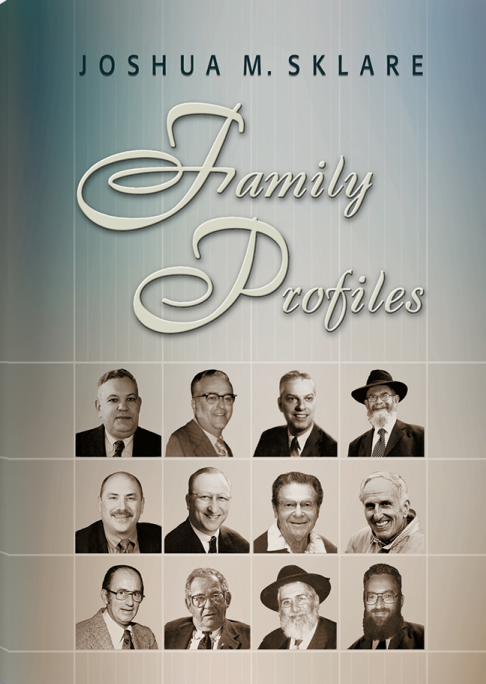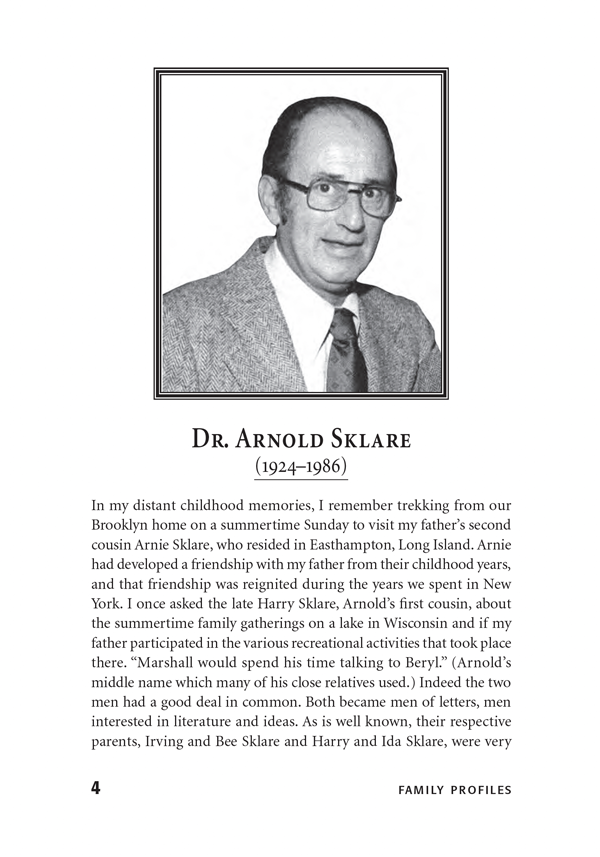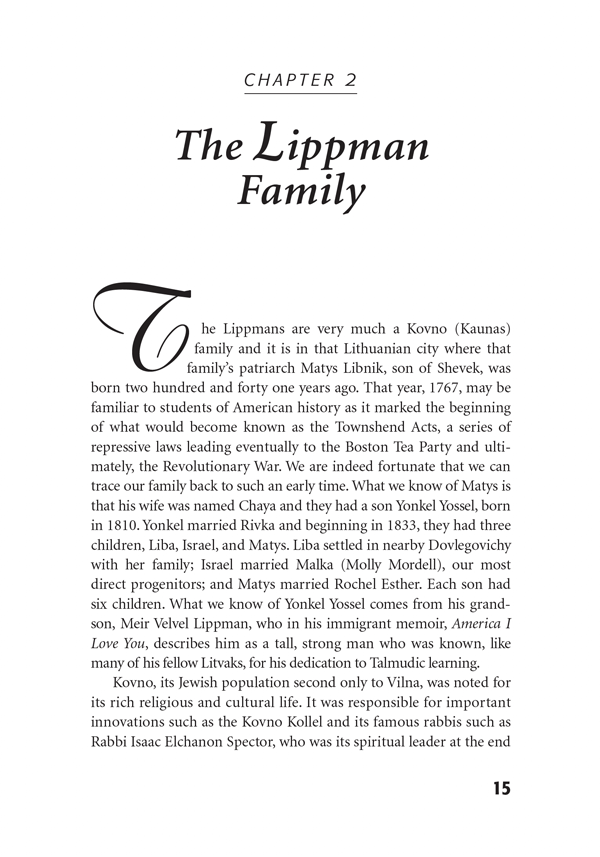


Family Profiles
A Family History
By Joshua M. Sklare
Published 2009, 183 Pages
Born 1931 Chicago, IL - Died 2008 Highland Park, IL
Industry: Real Estate Development
This books profiles 12 members of the greater Sklare family, many rising from humble beginnings to find success and fulfillment in their respective fields.
Dr. Arnold Sklare (1924–1986)
In my distant childhood memories, I remember trekking from our Brooklyn home on a summertime Sunday to visit my father’s second cousin Arnie Sklare, who resided in Easthampton, Long Island. Arnie had developed a friendship with my father from their childhood years, and that friendship was reignited during the years we spent in New York. I once asked the late Harry Sklare, Arnold’s first cousin, about the summertime family gatherings on a lake in Wisconsin and if my father participated in the various recreational activities that took place there. “Marshall would spend his time talking to Beryl.” (Arnold’s middle name which many of his close relatives used.) Indeed the two men had a good deal in common. Both became men of letters, men interested in literature and ideas. As is well known, their respective parents, Irving and Bee Sklare and Harry and Ida Sklare, were very close, and shared much in common. Neither of these two fathers was formally educated nor did either home encourage book learning. It was on their own that both sons found their callings. Arnie Sklare was born in Chicago in 1924 to Harry and Ida Soglow Sklare. He spent his formative years in the Albany Park neighborhood of Chicago where he distinguished himself as a fine student, eventually matriculating at the University of Illinois and the University of Notre Dame and serving in the United States Marine Corps. He completed his graduate studies not in the United States, but in Paris where he obtained his doctorate from one of the world’s greatest universities, the Sorbonne. But his career was a most unusual one. While he held a full time faculty position at C.W. Post College, he combined his teaching and scholarship with the very practical real world vocation of being a professional business writer and a writing consultant. One of his first jobs was as a technical writer for Pfizer, the large pharmaceutical concern, where he developed a feel for how to write manuals, reports and all other written communications in the corporate world. He wrote two important books which were geared to a business-oriented audience, Creative Report Writing and The Technician Writes: A Guide to Basic Technical Writing, which proved a useful resource to a plethora of executives and managers. He also wrote a book with his friend, William Earl Buckler, Dean of the Washington Square College of Arts and Sciences at New York University, entitled Essentials of Rhetoric, which was a primer for college students taking Freshman Rhetoric. But Arnold Sklare did not limit his books to the study of rhetoric. He edited two important works on literature, one with William Buckler, Stories from Six Authors and another which may have been his most significant contribution to scholarship, the Art of the Novella. A novella is shorter than the standard novel and longer than a short story. While much has been written about those two genres, there has been precious little work done on the novella, even though some works of this type, like Joseph Conrad’s Heart of Darkness and George Orwell’s Animal Farm are among the most important pieces of 20th century fiction. And Arnie Sklare showed his command of a wide range of writers. He included in his anthology selections from Leo Tolstoy, Herman Melville, Andre Gide, James Joyce, Katherine Mansfield, and Kather ine Anne Porter, providing valuable commentary and insights on style and substance. Arnie Sklare was not only a passionate teacher and writer but cared deeply about people who came into his life. He was not one to remain sequestered in the Ivy Tower or to focus exclusively on promoting his own work and side business. He organized and ran a writer’s institute which assisted many young and aspiring writers and sought to do the same for his students. As his brother Jack Sklare related to me, there was a Hispanic janitor working at the university whose son, Jorge, seemed to display the interest and ambition to progress scholastically. The father would occasionally bring the boy to the university and with the father’s encouragement, Arnie took him under his wing, providing valuable mentorship and friendship. Through Arnold’s assistance, Jorge received an excellent post–high school education and took a position in a hospital as an operating room technician. Arnold clearly understood the importance of education as a means of bettering oneself in American society and was happy to steer this young man in an appropriate direction. The young man never forgot what Arnie had done for him and visited him in the hospital as he lay seriously ill. Sadly, Arnold Sklare died in 1986 but his legacy and spirit live on.

